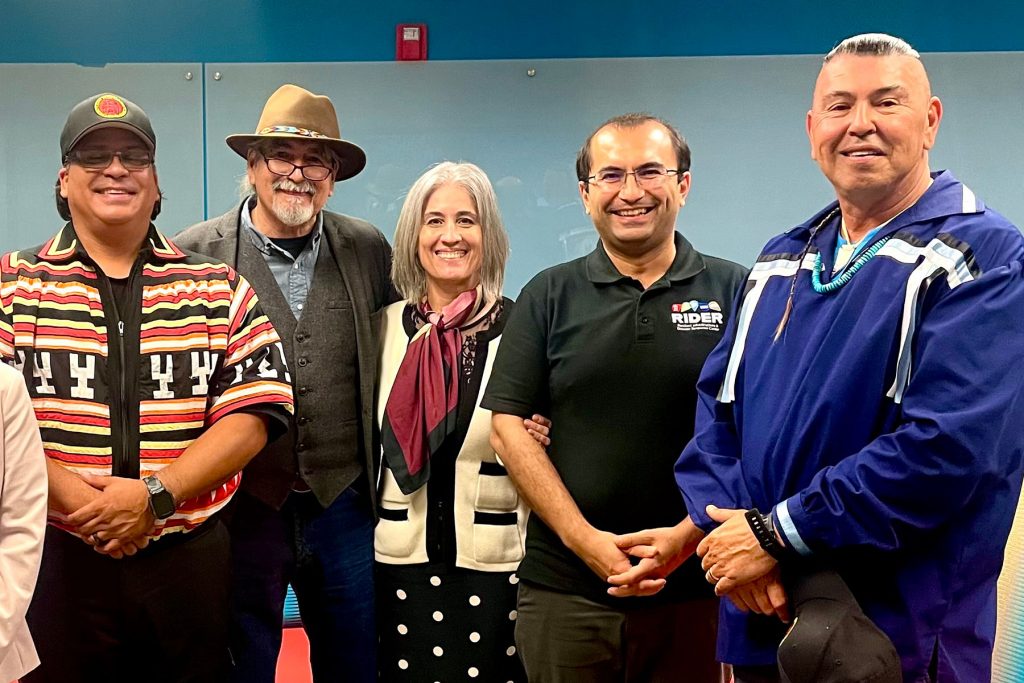FSU Indigenous knowledge workshop discusses challenges in building resilient coastal communities

Florida State University recently hosted “Saving the Planet with Indigenous Knowledge,” a free workshop exploring the concept of adaptive resilience for the Florida Gulf’s coastal communities, with a focus on the inclusion of Indigenous knowledge.
The event was part of a National Science Foundation Research Coordination Network (RCN) award project focused on resilient rural infrastructure. Its goal was to foster a new understanding of the complex interactions among key elements of community resilience in rural coastlines and inland areas to adapt to an ever-changing climate and potential natural disasters.
“This RCN project is about creating connections all over the United States, in addition to Florida, to develop disaster resilience actions, tools, strategies, plans and policies — with a focus specifically on our rural areas,” said Eren Erman Ozguven, associate professor of civil and environmental engineering in the FAMU-FSU College of Engineering, director of the Resilient Infrastructure and Disaster Response (RIDER) Center and principal investigator on this project. “When you talk about rural areas, there are many different vulnerable populations that we need to consider.”
In 2022, Ozguven held a workshop with a focus on Hurricane Michael’s impact on rural areas in the Panhandle. Gathering leading community members, government, industry and researchers, this workshop provided insight on how to bridge the “resilience divides” these rural communities have been facing.
“We are now getting into the discussion with the Seminole Tribe of Florida and how Indigenous communities cope with disasters, learning from them, and we also hope to help them as well,” he said. “They have a way of enduring these events — so it is a way to gather their knowledge into disaster planning.”
“Saving the Planet with Indigenous Knowledge” brought together experts from across FSU, including the FAMU-FSU College of Engineering and its RIDER Center, the College of Social Work, the Stoops Center for Communities, Families, and Children and the Native American and Indigenous Studies Center.
Representatives from the Seminole Tribe of Florida, the FAMU-FSU College of Engineering faculty, FEMA, Florida A&M University Emergency Management and FSU Emergency Management were present as members of an emergency management professionals panel.
The post FSU Indigenous knowledge workshop discusses challenges in building resilient coastal communities appeared first on Florida State University News.
Latest All News
- Rules for FSU’s Spring CommencementWe extend our warmest congratulations to all graduates and their guests. As we celebrate this milestone together, we kindly ask […] The post Rules for FSU’s Spring Commencement appeared first on Florida State University News.
- FSU researcher receives $1.5M in funding to partner with the Bureau of Ocean Energy Management to identify submerged landscapesA Florida State University researcher has received $1.5 million in funding to partner with the Bureau of Ocean Energy Management, […] The post FSU researcher receives $1.5M in funding to partner with the Bureau of Ocean Energy Management to identify submerged landscapes appeared first on Florida State University News.
- ‘Proud to be at FSU’: Far from their homeland, mother and two sons achieve together on campusIbrahim Gillani appreciates the “tight knit” community. His younger brother, Shahmeer Mustafa Gillani, beholds the “very beautiful” campus. And their […] The post ‘Proud to be at FSU’: Far from their homeland, mother and two sons achieve together on campus appeared first on Florida State University News.
- Opening Nights at FSU announces new chairOpening Nights at Florida State University’s Development Council has selected Ron Sachs as its chair for the 2024-2025 season. In […] The post Opening Nights at FSU announces new chair appeared first on Florida State University News.
- FSU awards three faculty with Distinguished University Scholar awardFlorida State University has awarded three outstanding faculty members with the Distinguished University Scholar Award in recognition of their long-standing […] The post FSU awards three faculty with Distinguished University Scholar award appeared first on Florida State University News.
- FSU neuroscientists discover two specific brain differences linked to how brains respond during tasksA new study by neuroscientists at Florida State University has revealed brain differences that may explain why humans demonstrate a […] The post FSU neuroscientists discover two specific brain differences linked to how brains respond during tasks appeared first on Florida State University News.









